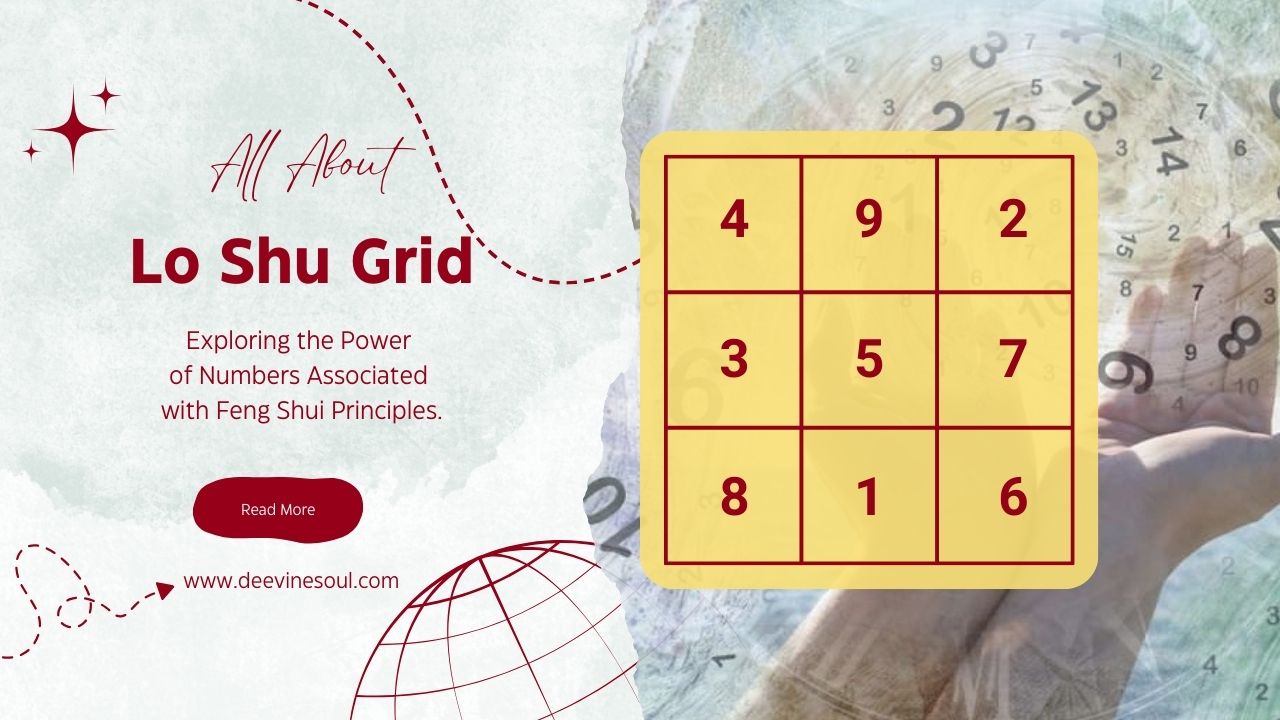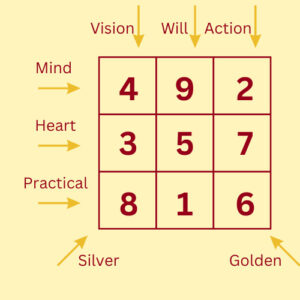Lo Shu Grid Planes and Their Importance
The Lo Shu Grid, a mystical numerical arrangement originating from ancient Chinese numerology, holds deep significance in both metaphysical and philosophical contexts. Also known as the “Magic Square,” the grid is made up of a 3×3 matrix, with numbers ranging from 1 to 9 arranged in a way that every row, column, and diagonal adds up to 15.
This arrangement has been revered for centuries as a symbol of balance and harmony, representing the interconnectedness of nature and the universe. The Lo Shu Grid serves as the foundation for understanding personality, life energies, and one’s relationship with the cosmos in Chinese metaphysical practices.
The grid is often associated with Feng Shui principles, used in the context of balancing energies in a living or work environment, and in numerology for analyzing personality traits and life paths.
Table of Content - Lo Shu Grid Planes

Concept of Planes in the Lo Shu Grid

The Lo Shu Grid’s planes are essential in numerology, as they are believed to represent different aspects of a person’s life or energies. These planes are derived from the numerical arrangement of the grid and are divided into three categories:
Horizontal Planes (Mind, Emotional, Practical)
Vertical Planes (Action, Vision, Will)
Diagonal Planes (Golden, Silver)
Horizontal Planes
Mind Plane (4-9-2): This plane reveals an individual’s intellectual abilities, reasoning, and analytical skills. A strong Mental Plane suggests logical thinking, creativity, and problem-solving capacity, while a weaker one may indicate a need for intellectual growth.
Emotional Plane (3-5-7): It governs emotions, relationships, and interpersonal skills. People with a strong Emotional Plane tend to be compassionate and emotionally intelligent. A weak plane might signify difficulties in forming or sustaining relationships.
Practical Plane (8-1-6): This represents the practical and physical aspects of life, including action, discipline, and determination. Individuals with a solid Practical Plane are grounded and capable of manifesting ideas into reality.
Vertical Planes
Action Plane (2-7-6): This plane deals with how individuals express themselves through actions and decision-making. A balanced Action Plane leads to confident, calculated actions.
Vision Plane (4-3-8): The Thought Plane controls how a person processes information and makes decisions. A strong Thought Plane can lead to clear thinking and well-planned outcomes.
Will Plane (9-1-5): This plane indicates a person’s strength of will and persistence. A balanced Will Plane fosters resilience and inner strength.
Diagonal Planes
Golden Plane (4-5-6): This he Lo Shu Grid is closely associated with the attainment of name, fame, and financial prosperity. Individuals whose numbers align with the Golden Plane often experience significant success in life, particularly in areas related to public recognition and material wealth.
Silver Plane (2-5-8): This Lo Shu Grid is connected to property, land, and agriculture, as well as the individual’s strengths and weaknesses in handling these aspects. This plane indicates a person’s ability to acquire, manage, and benefit from physical assets such as land, real estate, and agricultural ventures.
Significance in One’s Life
Self-Discovery and Personality Analysis
It provide a blueprint for self-awareness. By analyzing the positions and frequencies of numbers within the grid, individuals can gain insights into their inherent characteristics, strengths, and challenges. Understanding which planes are dominant or underdeveloped can help in identifying areas of life that need more attention or balance. For instance, an individual with a dominant Emotional Plane may excel in building relationships but might need to focus more on practical or intellectual growth.
Life Path and Decision-Making
The planes help guide decision-making by offering clarity on one’s natural tendencies and life path. People can use the insights from the Lo Shu Grid to make more informed decisions about their careers, relationships, and personal development.
For example, individuals with a strong Practical Plane are often more suited to roles requiring organization and execution, while those with a strong Thought Plane may excel in intellectual or creative pursuits.
Balancing Energies for Harmonious Living
In Feng Shui and other metaphysical practices, the balance of energies is crucial for leading a harmonious life. The Lo Shu Grid’s planes help in understanding how energy flows through different aspects of an individual’s existence, and adjustments can be made to create better harmony.
A well-balanced grid ensures that energies from various planes—mental, emotional, and practical—are functioning in harmony. A misaligned or imbalanced grid could result in challenges such as financial difficulties, emotional struggles, or health issues. By addressing these imbalances, individuals can lead more fulfilled lives.
Spiritual Growth and Enlightenment
For those seeking spiritual enlightenment, the diagonal planes, particularly the Spiritual Plane (3-5-7), provide insights into one’s spiritual journey. The Lo Shu Grid acts as a spiritual compass, guiding individuals toward self-realization and a deeper connection with the universe.
By understanding how different planes influence spiritual growth, individuals can identify areas where they may need to focus more energy, whether through meditation, spiritual practices, or introspection. This helps in fostering spiritual enlightenment and aligning with one’s higher purpose.
